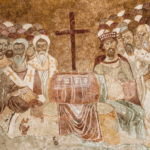Here are the highlights of my 2022 reading year (in no particular order).
Everything Sad is Untrue by Daniel Nayeri
On a basic level, Everything Sad is Untrue tells the story of Daniel Nayeri’s early life in Iran and his family’s traumatic escape to a new life in America. But such a description fails to convey the joy, humour and magic of this wonderful book. Nayeri recounts his story from the perspective of his younger self—sometimes as if it were a tale from the Arabian Nights. He writes with a wide-eyed appeal, a knowing wink, and with unabashed love for the Saviour who upended his childhood. Listen to Collin Hansen’s interview with Nayeri here.

Everything Sad Is Untrue: (a true story)
Daniel Nayeri
In an Oklahoman middle school, Khosrou (whom everyone calls Daniel) stands in front of a skeptical audience of classmates, telling the tales of his family’s history, stretching back years, decades, and centuries. At the core is Daniel’s story of how they became refugees—starting with his mother’s vocal embrace of Christianity in a country that made such a thing a capital offense, and continuing through their midnight flight from the secret police, bribing their way onto a plane-to-anywhere. Anywhere becomes the sad, cement refugee camps of Italy, and then finally asylum in the U.S. Implementing a distinct literary style and challenging western narrative structures, Nayeri deftly weaves through stories of the long and beautiful history of his family in Iran, adding a richness of ancient tales and Persian folklore.
Nayeri writes with a wide-eyed appeal, a knowing wink, and with unabashed love for the Saviour who upended his childhood.
The Glory of Christ by John Owen (pdf)
John Owen was an overly wordy writer—even by the standards of his day. Yet what he wrote was profound and fortifying. The Glory of Christ is a treasure chest of insight and encouragement. What struck me with particular force was how little we modern heirs of Puritan theology follow their spirituality. Owen rebukes us, charging us to be more active in our pursuit of an experience of Christ’s glory:
[A] steady view of the glory of Christ, in his person, grace, and office, through faith … is the only effectual way to obtain a revival from under our spiritual decays.
How to Talk about Jesus without Being That Guy by Sam Chan
There seems to be a bit of repetition in Sam Chan’s different books and online discussions on evangelism, but it is always such good and helpful stuff (and stuff that I need to keep hearing) that I am more than happy for him to keep saying it. I always come away with great practical advice on how to share my faith better, and I always enjoy hearing Chan explain things in his inimitable and hilarious style. If you need a shot in the arm, get hold of this short book.
Faith, Hope and Carnage by Nick Cave and Sean O’Hagan
In 2015, Nick Cave’s son Arthur fell to his death, plunging the singer into an existential and creative crisis. But it didn’t destroy him. It made him wiser and more reflective, and more open to religious faith. Though he had always been drawn to the imagery and concepts of the Bible, Cave’s post-Arthur years saw him trying to live and think as if it were true.
Cave has discovered that Christianity is good and necessary for life, whether true or not.
I still don’t think Cave is a Christian. He doesn’t really seem to understand the utter freedom of grace or the lordship (or loveliness) of Jesus. He seems to hope that he might be able to redeem himself through his music. But like a few other contemporary thinkers, Cave has discovered that Christianity is good and necessary for life, whether true or not.
I listened to this series of conversations between Nick Cave and Sean O’Hagan as an audiobook and would highly recommend that way of approaching it.
Biblical Critical Theory by Chris Watkin
Chris Watkin’s new book has been roundly and justly praised (see, for example, Rory Shiner’s TGCA review). Its conversation between biblical theology and western culture is so profound, so well-informed, and so timely in our think-little, tweet-much culture. Read it slowly—or better still, read it with friends.
Strange New World by Carl Trueman
I remain a great fan of academics producing shorter accessible versions of their greater tomes (take note, Chris Watkin). The exercise doesn’t just benefit slow readers (like me); it helps the author express themselves better. In this (still pretty dense) book, Trueman offers a more accessible version of his earlier work, The Rise and Triumph of the Modern Self. This book provides a profoundly insightful excavation of our be-yourself present and would be a great companion to Tom Holland’s Dominion or Watkin’s book. See John McClean’s TGCA review here.
I Am the Doorway by Eric Ortlund
Eric Ortlund’s cosmic horror novel was an unexpected pleasure in my reading year. Imagine if H.P. Lovecraft had been a Christian and could write well, and then somebody spiked his fruit juice with LSD; that might give you some idea of this strange time-travelling end-of-the-world fever dream. I most definitely didn’t understand everything that was going on (pretty much a genre prerequisite), but I grasped enough to appreciate what Ortlund was doing and enjoy it. I have sometimes wondered if there could be a greater place for the uncanny in Christian fiction. I Am the Doorway proves the affirmative.
Calor by J.J. Fischer
(TGCA contributor) J.J. Fischer’s Calor is a feast of mystery, magic, adventure and (possibly) romance. Set in a strange post-technological and post-apocalyptic world of sword and magic, Calor tells the story of a preternaturally gifted slave fleeing her abusive master in the company of a mysterious nobleman and his retainers—all harbouring dark secrets and psychic wounds. Beneath the intrigue and personal tragedies, there are global conflicts brewing. Further below, big themes to do with guilt, memory, beauty and meaning stir in the depths. Fischer is a great writer, storyteller and world-builder and I look forward to reading the next book in this series.















